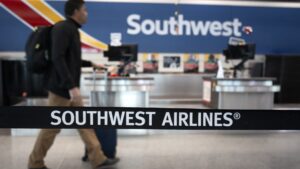Southwest Airlines Implements Controversial Policy Shift: What It Means for Travelers and the Airline Industry
The End of an Era? Southwest Airlines’ Free Baggage Policy is History
For over 50 years, Southwest Airlines has represented a beacon of consumer-friendly policies in the airline industry—most notably, its famed "two checked bags fly free" slogan. On May 28, 2025, that all changes as Southwest undoes this cornerstone of its customer experience, marking a dramatic shift for one of America’s largest airlines.
The decision, of course, hasn’t been well-received. Customers are expressing their frustration, citing the free baggage allowance as a primary reason for choosing the airline. In the words of traveler MaKensey Kaye Alford, “It was the only reason I flew Southwest.” As travelers become increasingly price-sensitive and options grow, this policy change could lead to significant shifts in customer loyalty.
Why Is Southwest Making This Change?
The motivation behind shifting the baggage policy is rooted in financial necessity. As most industry insiders are aware, the airline sector has seen a marked increase in competition, notably from Delta and United, which have outpaced Southwest in terms of revenue growth. In response, Southwest is under pressure to boost profits while maintaining its established market share.
Despite previously committing to a no-baggage-fee policy, higher operational and competitive pressures have changed the playing field. Recent investor activities, including the influence of activist hedge funds like Elliott Investment Management, have also prompted Southwest to reconsider longstanding practices, giving it broader leeway to make profit-driven decisions.
As Market Dynamics Shift, So Do Customer Expectations
In 2023 alone, U.S. airlines collected over $7 billion in baggage fees. That’s a clear indicator that public sentiment toward airline fees has evolved. It seems that the days of complimentary perks are waning as airlines, including Southwest, tighten their belts post-pandemic. As competition intensifies, features once taken for granted are now reserved for loyalty program members or consumers paying for higher-tiered tickets.
In this landscape, Southwest’s move to start charging for checked bags may not be the last. The reorganization also includes a shift toward assigned seating, the introduction of a basic economy ticket without frills, and even expiration dates for flight credits—each step undertaken to adapt to the evolving market.
The Investor vs. Customer Paradigm
This policy change not only affects customers but also paves the way for shifts in investor sentiment. Following the announcement of new bag fees, Southwest’s shares experienced a notable rise—nearly 9% in a single week. In contrast, rival airlines experienced declines in share prices, indicating a potential investor alignment with Southwest’s strategic pivots.
Dan McKenzie, an airline analyst at Seaport Research Partners, remarked that shareholder activism is ushering Southwest into a new era focused on profitability. However, many fear that the changes could jeopardize the carrier’s well-loved customer-oriented image, earning it long-term repercussions.
Will Customers Abandon Southwest?
As travelers weigh their options, many are considering alternatives—some even expressing willingness to switch to airlines that provide more amenities for a similar price. As Errol Joseph, a frequent flyer, noted, "With the baggage policy change, there’s pretty much no reason to be loyal."
Airlines like Delta and United are eyeing the opportunity to attract former Southwest customers. Yet, the reality is complex, with significant consolidation resulting in fewer options for travelers. Southwest’s substantial market dominance at key airports means that even if some choose to stray, many will have limited viable alternatives.
The Operational Impact: What’s Next for Southwest?
With the baggage fee looming, operational dynamics will likely shift as well. Airlines typically rely on quick turnarounds to keep their schedules and profitability on track. Charging for checked luggage has the potential to slow operations; if customers opt to carry more on-board luggage to avoid fees, it could lead to bottlenecks during boarding.
Southwest has acknowledged this challenge and is preparing accordingly. They are reportedly retrofitting their aircraft with larger overhead bins and equipping gate agents with tools to streamline the boarding process.
Final Thoughts
The evolving landscape of air travel is undeniable, and while Southwest Airlines has been a leader in customer-friendly practices, it seems they are restructuring for profitability in an increasingly competitive market. As the saying goes, “Change is the only constant.”
As travelers gear up for this new chapter in air travel, they must consider what these shifts mean for their flying experiences. At Extreme Investor Network, we are committed to bringing you the most relevant insights into how these industry changes will shape both investor opportunities and consumer experiences. Keep reading as we continue to monitor Southwest Airlines’ trajectory and the broader implications for the airline industry.

